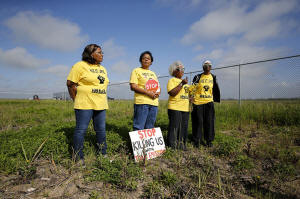In policy reversal, Trump eliminates help for Black and Latino
communities hit harder by pollution
 Send a link to a friend
Send a link to a friend
 [January 27, 2025]
By MICHAEL PHILLIS and ALEXA ST. JOHN [January 27, 2025]
By MICHAEL PHILLIS and ALEXA ST. JOHN
For four years, the Environmental Protection Agency made environmental
justice one of its biggest priorities, working to improve health
conditions in heavily-polluted communities often made up largely of
Black, Latino and low-income Americans. Now that short-lived era is
over.
President Donald Trump in his first week eliminated a team of White
House advisors whose job it was to ensure the entire federal government
helped communities located near heavy industry, ports and roadways.
Trump eliminated the “Justice40” initiative the Biden administraton had
created. It required 40% of the benefits from certain environmental
programs go to hard-hit communities.
When the government reviews new facilities now, experts say officials
are likely to ignore how any pollution they create may exacerbate what
communities already experience. Trump's actions will likely halt funds
from Biden administration’s signature climate law, the Inflation
Reduction Act, for climate programs and environmental justice.
In making the decision this week, Trump eliminated federal policy dating
back to the Clinton-era, which had established a government priority of
addressing environmental health problems for low-income and minority
groups. He also withdrew the nation from the Paris Agreement aimed at
combatting climate change.
The new administration's moves combine two goals: clawing back what
Trump officials say are onerous environmental policies that constrain
development and fighting diversity, equity and inclusion, according to
Joe Luppino-Esposito, federal policy chief with the free-market law firm
Pacific Legal Foundation.

“We've had this discussion at the Supreme Court and otherwise for many
years, past discrimination is not an excuse for future discrimination,"
he said, adding that Trump's executive orders allow the law to be
enforced “without a specific racial tinge to it."
Many experts say Biden accomplished more than any previous
administration in this area.
An EPA-funded study found, for example, that Black people at all income
levels are more likely to breathe pollution that causes heart and lung
problems. Under Biden, regulators wrote public health rules, tighter air
pollution standards and proposed mandates for harmful lead pipes. The
EPA issued the largest-ever fine under the federal Clean Air Act and
said it slashed more than 225 million pounds of pollution in
overburdened communities. Federal grants went to communities to clean up
Superfund sites or buy low-emissions school buses. The EPA set up an
office to facilitate its substantial environmental justice work.
“What I’m grappling right now with is both the grief of these losses,
and the fact that we were on an upward swing, if you will, just weeks
ago,” said Jade Begay, an Indigenous rights and climate organizer in New
Mexico.
For years, government support for grassroots environmental justice
efforts rose and fell depending who occupied the White House. Scrappy,
local groups found ways, sometimes with help from foundations, to get
their work done regardless. The Biden administration spent time,
attention and resources on the issue, making it higher profile — and a
bigger target, according to Christophe Courchesne, a law professor and
interim director of the Environmental Law Center at the Vermont Law and
Graduate School.
Environmental justice got swept up into "this pitched battle over
diversity, equity and inclusion,” Courchesne said. “This developed over
time into a target of conservative activism.”
[to top of second column]
|

Myrtle Felton, from left, Sharon Lavigne, Gail LeBoeuf and Rita
Cooper, members of RISE St. James, conduct a live stream video on
property owned by Formosa on March 11, 2020, in St. James Parish,
La. (AP Photo/Gerald Herbert, File)

Daniel Gall, an EPA spokesman, said the agency under Trump will work
for clean air, land and water.
“EPA is working to diligently implement President Trump’s executive
orders,” he said.
The policy changes diverge from the last time Trump was president.
Scott Pruitt, who headed the EPA for part of Trump’s first term,
once called environmental justice conversations “critical to
improving environmental and public health outcomes.” Trump’s new
orders are more sweeping; moves that Rena Payan, chief program
officer at the Oakland, California nonprofit Justice Outside, called
“rolling back decades of progress in addressing environmental
discrimination.”
The Trump administration is not only ditching long-standing
policies, it is directing agencies to eliminate jobs dedicated to
environmental justice and diversity, equity and inclusion issues,
according to a recent memo.
They are not limited to the public sphere. The new administration is
also looking to remove diversity, equity and inclusion efforts in
the private sector — a step that goes further than some anticipated,
according to Julius Redd, an environmental attorney at Beveridge &
Diamond P.C.
Anne Rolfes, director of the Louisiana Bucket Brigade, which helps
communities in the heart of the petrochemical industry, echoed other
advocates and said the Biden administration did some great things,
but didn't do nearly enough to enforce the law, allowing polluters
too much free reign in heavily industrialized Louisiana.
Now it'll get worse and an already industry-friendly state is likely
to let polluters build even more quickly. "We just have to buckle up
and get ready," she said.
That change feels disheartening to Ash LaMont, national campaigns
director for Honor The Earth, a non-profit focused on raising
awareness and support for environmental issues in Native American
communities.
“We’ve been spending a lot of time really figuring out what is our
next step, what are the things that we can do that will last,
despite the administration, and what are the very apparent needs of
our community members,” she said.
Trump's decision to cut off support will hurt, but many of these
local organizations will return to operating without federal
support, said Peggy Shepard, co-founder and executive director of WE
ACT for Environmental Justice in New York.

Advocacy will shift to the state and local level. That might work in
some places, but it'll be an uphill battle in Republican-controlled
states like Louisiana and Texas where there's little receptivity to
that advocacy, she said.
“They were finally beginning to get support at the EPA and at the
White House," she said, “and this is a big step back for the
communities who are front line to some of these issues.”
___
St. John reported from Detroit.
___
Associated Press writer Matthew Daly contributed reporting from
Washington.
All contents © copyright 2025 Associated Press. All rights reserved |